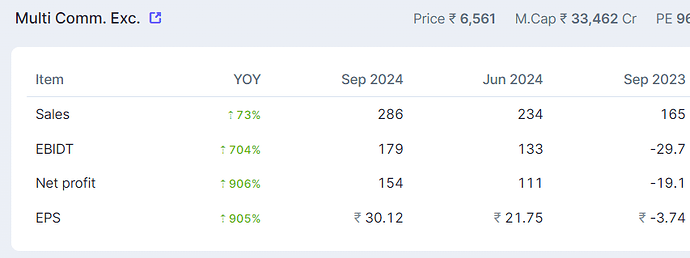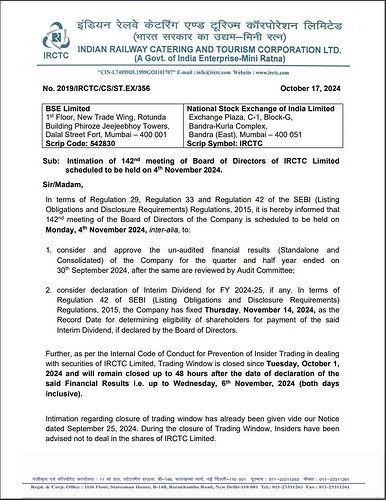Stocks like Axis Bank, ICICI Bank, Hindalco, Reliance Industries, SBI, and Bank of Baroda have formed bullish patterns, while DLF and Macrotech Developers are expected to face corrections, analysts said.
Wall Street zeroes in on semiconductors after turbulent week (21-10-2024)
Because semiconductors are key components in a broad array of products, chipmakers and related equipment companies are closely followed for insight into the economy. Wall Street also watches the stocks as indicators of overall market trends.
HDFC Bank’s board approves Rs 12,500-cr IPO for HDB Financial (21-10-2024)
The NBFC will also issue fresh equity shares worth ₹2,500 crore in the IPO, taking the total size of the issue to around ₹12,500 crore, the bank said in a notice to the stock exchanges.
Give Leverage, Will Trade: MTF book rises to Rs 84,800 cr (20-10-2024)
The money borrowed under the brokers’ margin trading funding (MTF) facility – a system allowing investors to borrow to buy shares they cannot afford – swelled by 50% jump last week from March 31, as interest rate cuts on loans for trading in the market recently has encouraged individuals to use more of this funding product.
FPIs pull out Rs 23,274 crore from financial services in 15 days (20-10-2024)
Financial services bore the biggest brunt of foreign selling, with investors pulling ₹23,274 crore out of these shares after buying a similar amount in September. From January to September, overseas investors sold ₹37,732 crore in the sector.
Kotak Mahindra Bank – Low Cost Liability Banking Franchise (20-10-2024)
Other banks don’t have a 100% ownership in all of there subsidiaries. In Kotaks case the value of subsidiaries is much higher as % almost 50% if you remove the holding company discount. But i take your point most banks are trading around 2.2-2.3x core PB value. ICICI bank may be the most expensive one.
Given small size feel Kotak can grow much faster than peers + there is optionality in terms of M and A, Increasing leverage(Kotak has least leverage) will see the Pat growth will be faster than balance sheet growth.
At 19-20x PE, Pat growth over next decade can be 18-20% believe it is fairly priced. Given the rest of the market is so expensive market could come back and start giving premium for 15% consistent growth companies if the rest of the market earnings growth slows down as it happened between 2014-2018
Oberoi Realty-A simple real estate story (20-10-2024)
Jardin launch response.
Prudent Corporate Advisory Services Ltd (20-10-2024)
About Prudent Corporate Advisory Services Limited
Incorporated in 2003, Prudent Corporate Advisory Services Ltd. is a leading independent retail wealth management services group in India. The company provides a wide range of financial products and services, specializing in mutual funds distribution, insurance products, stockbroking, and comprehensive wealth management solutions. It operates through a network of over 1,300 branches across India, serving retail investors and helping them plan their financial futures with customized advisory services.
Key Points:
Business Model: Prudent Corporate primarily acts as an intermediary between mutual fund companies and retail investors, providing distribution and advisory services to help clients make informed investment decisions.
Revenue Mix: Prudent earns income from commissions on mutual fund distribution, insurance product sales, stockbroking, and fee-based advisory services.
Client Base: The company serves over 20,000 independent financial advisors (IFAs) and retail investors, positioning itself as a significant player in the wealth management space.
Business Segments:
Mutual Funds Distribution: This segment represents the largest source of revenue for Prudent, with a strong presence in Tier 2 and Tier 3 cities.
Insurance Products: Prudent offers life and non-life insurance solutions to its clients, expanding its footprint in the insurance advisory market.
Stockbroking and Wealth Management: Prudent provides a range of stockbroking services and personalized financial planning for clients through a dedicated wealth management advisory team.
Expansion and Growth:
Prudent has experienced significant growth in its assets under management (AUM), expanding its network across underserved markets in India. The company has also focused on digitizing its services, offering online platforms for seamless investment tracking and advisory services.
Financial Performance:
Assets Under Management (AUM): Prudent has steadily increased its AUM, benefiting from a growing interest in retail investment in India, particularly mutual funds.
Profitability: The company has demonstrated consistent profitability, with rising revenues from both its mutual fund distribution and insurance advisory businesses.
Strategic Initiatives:
Technology Focus: Prudent is investing in digital platforms to enhance user experience and increase client acquisition through online channels.
Partnerships: The company has established partnerships with leading asset management companies (AMCs) and insurance firms to offer a diverse range of products to its clients.
Strengths:
Extensive Distribution Network: Prudent’s strong presence across India, especially in smaller towns and cities, allows it to tap into underserved markets.
Comprehensive Product Offering: By providing access to a wide array of financial products, Prudent ensures it meets diverse investor needs.
Technology-driven Growth: Prudent’s focus on digital platforms provides an edge in a rapidly evolving financial advisory space.
Weaknesses:
Dependence on Mutual Fund Distribution: A significant portion of Prudent’s revenue comes from mutual fund commissions, making the company susceptible to fluctuations in market conditions.
Limited Brand Recognition: Prudent faces challenges in building brand awareness compared to larger financial institutions, which may impact client acquisition.
Opportunities:
Growing Retail Investment in India: With rising awareness of financial planning and investment, Prudent is well-positioned to benefit from increased retail participation in mutual funds and insurance products.
Untapped Markets: There is significant room for growth in Tier 2 and Tier 3 cities, where demand for wealth management services is increasing.
Threats:
Regulatory Changes: Changes in regulations governing mutual fund commissions and advisory fees could impact Prudent’s revenue model.
Competition: The wealth management industry is highly competitive, with both established financial institutions and fintech startups vying for market share.
Business Strategy:
Prudent’s strategy revolves around expanding its distribution network, increasing AUM, leveraging technology for client acquisition, and diversifying its revenue streams by growing its insurance and stockbroking segments. The company is also focusing on improving operational efficiency through digital initiatives, enhancing customer engagement, and offering more personalized financial planning solutions.
Board of Directors:
Sanjay Shah (Managing Director): Leads the company’s strategic vision and has been instrumental in expanding Prudent’s operations across India.
Chirag Shah (Director): Oversees the wealth management business and focuses on strengthening client relationships and service offerings.
Shareholding Pattern (as of September 2024):
Promoter and Promoter Group: 63.19%
Foreign Institutional Investors (FIIs): 10.25%
Domestic Institutional Investors (DIIs): 12.56%
Public Shareholding: 14%
Prudent Corporate Advisory Services is a growing player in India’s wealth management sector, with a robust distribution network, a strong focus on mutual fund distribution, and opportunities for expansion in insurance and stockbroking. Its technology-driven approach and strategic initiatives position it well to capitalize on the increasing demand for financial advisory services in India, especially in underserved markets. However, the company faces challenges from regulatory changes and intense competition.
Disc: Invested 3.5 % of my portfolio


